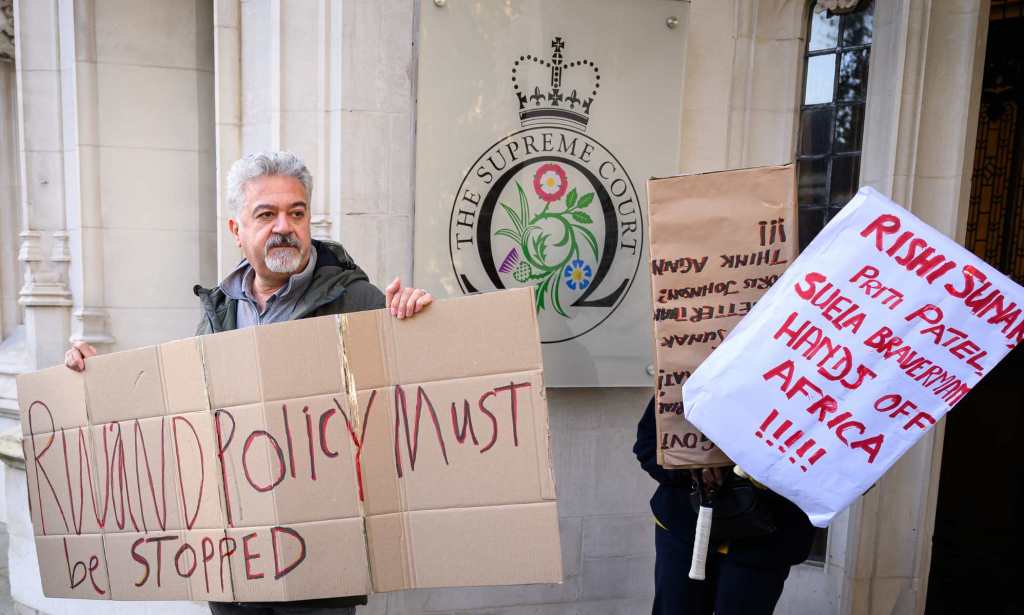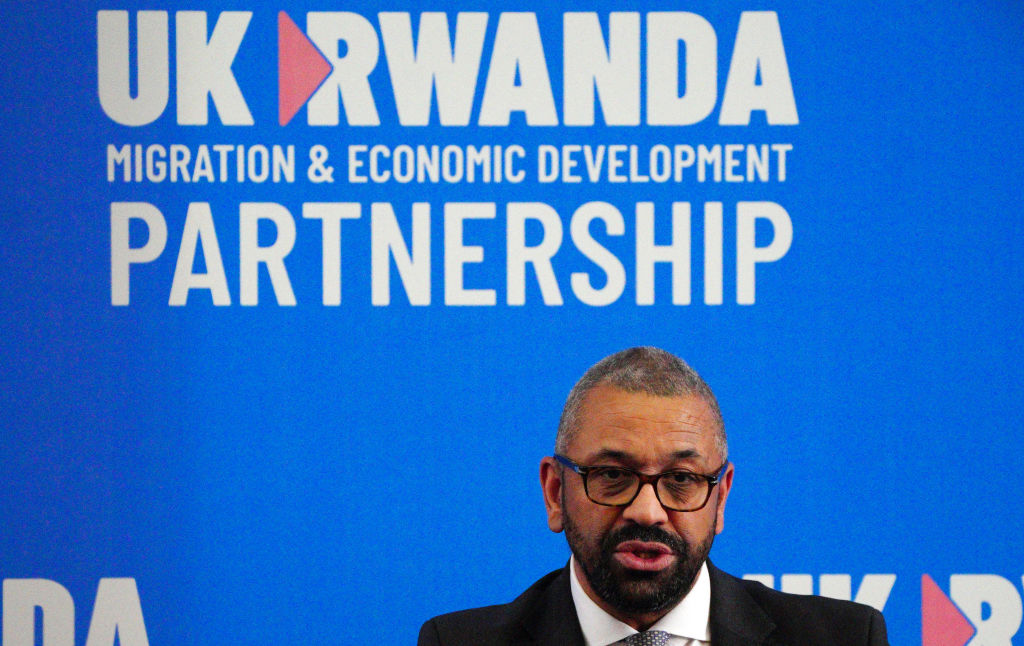Why is the UK government still pushing its Rwanda plan when it knows it’s not safe?

British Home Secretary James Cleverly (L) and Rwandan Minister of Foreign Affairs Vincent Biruta hold a bilateral meeting after they signed a new treaty with Rwanda on December 5, 2023 in Kigali, Rwanda. (Ben Birchall – Pool/Getty)
The UK government is still doggedly pursuing its Rwanda plan, even after the courts ruled it was illegal.
Home secretary James Cleverly signed a new treaty in Rwanda on Tuesday (5 December) as part of the government’s ongoing effort to have asylum seekers who arrive in the UK via means deemed “illegal” sent to the African country..
Just weeks ago, the Supreme Court ruled that the Rwanda plan was illegal. Lord Reed said those sent to Rwanda would be at “real risk” of being sent back to their home country, which would represent a breach of international law.
Cleverly’s new treaty seeks to address those risks. He told reporters that, under new terms, asylum seekers will not be deported back to their home country from Rwanda if doing so would put them in danger.
He also said a monitoring committee will oversee the treaty’s implementation, and an appeal body made up of judges from around the world will be set up.
Is Rwanda safe for LGBTQ+ people?
But problems still persist. Advocacy groups that work with refugees and asylum seekers have repeatedly warned that vulnerable people will end up being sent to Rwanda under the scheme, and that some – particularly LGBTQ+ people – would be unsafe there.
Bizarrely, the UK government appears to accept that Rwanda is not a safe place for LGBTQ+ people. According to its own travel advice for UK citizens, homosexuality remains “frowned on by many” in Rwanda.

“LGBT individuals can experience discrimination and abuse, including from local authorities. There are no specific anti-discrimination laws that protect LGBT individuals,” the government’s own travel advice says.
Micro Rainbow, a charity that supports LGBTQ+ people fleeing persecution, says its service users are “terrified at the prospect of being sent to Rwanda”.
“They fled their countries of origin to escape violent LGBTQIphobia to find safety, and legal protection in the UK. Now they are threatened with being sent somewhere where safety and rights are definitely not guaranteed, especially for LGBTQI people,” Rosalind Duignan-Pearson, communications manager at Micro Rainbow, tells PinkNews.
“The UK government has admitted that Rwanda is not safe for LGBTQI people, and Rwanda has no laws protecting the rights of LGBTQI people. Sending LGBTQI people to a country where they will be in danger of blackmail, violence and abuse is a shameful failure of duty towards people feeling persecution.”
Micro Rainbow believes the Rwanda plan would worsen an already difficult situation for vulnerable people who have already endured significant traumas. Sebastian Rocca, founder and CEO of Micro Rainbow, called on Cleverly to “put people’s lives, safety and dignity at the core of his policies”.
“He should abandon the Rwanda scheme once and for all, and create not only a fair and humane asylum system but also legal routes for people to seek asylum.
“Failure to do so will just be another sign that the leadership of the Conservative Party has lost touch with reality, with the will of the majority of the British people. British people want an asylum system that foregrounds empathy and compassion, something that Britain can finally be proud of both domestically and internationally.”
James Cleverly’s Rwanda asylum plan puts migrants at risk
Rainbow Migration, a charity that advocates for LGBTQ+ asylum seekers, pointed out that people from Rwanda have sought asylum in the UK based on their sexual orientation in the past – which is a strong indicator that it is not a safe country for LGBTQ+ people.

“People who arrive in the UK seeking asylum have fled persecution or conflict, and sending them 4,000 miles away to a place where they have no connections will only cause them further suffering,” a spokesperson said.
Innocent, a gay man who grew up in Rwanda and experienced anti-gay abuse first-hand, told Rainbow Migration that the UK government “should reflect more on its policy” and “take into account the public sentiment and what the civil society and other people representing vulnerable groups are saying”.
He added: “Most people seeking protection are fleeing for their lives and they need help, not punishment. I do hope that LGBTQIA+ people seeking safety will not be sent to Rwanda to face discrimination.”
A spokesperson for the Home Office defended the Rwanda plan, telling PinkNews that people won’t be deported to the country if doing so would put them at risk.
“Rwanda’s constitution includes a broad prohibition on discrimination and does not criminalise or discriminate against sexual orientation in law, policy or practice,” a spokesperson said.
“Everyone considered for relocation to Rwanda will be screened and have access to legal advice. Decisions will be taken on a case-by-case basis and nobody will be relocated if it is unsafe or inappropriate for them.”
However, there is still concern among advocacy groups about just how effective those screening tools will be, and whether it’s possible to ensure that no LGBTQ+ asylum seekers will be sent to Rwanda.
Judging by how successful the government has been so far in implementing its Rwanda plan, those fears may never come to pass. Even with Cleverly’s new treaty, the plan will likely face legal challenges once again – and if the courts still aren’t satisfied, it’s entirely possible that we’ll see more empty planes sitting grounded on runways while ministers try to find a way around the limits of the law.

